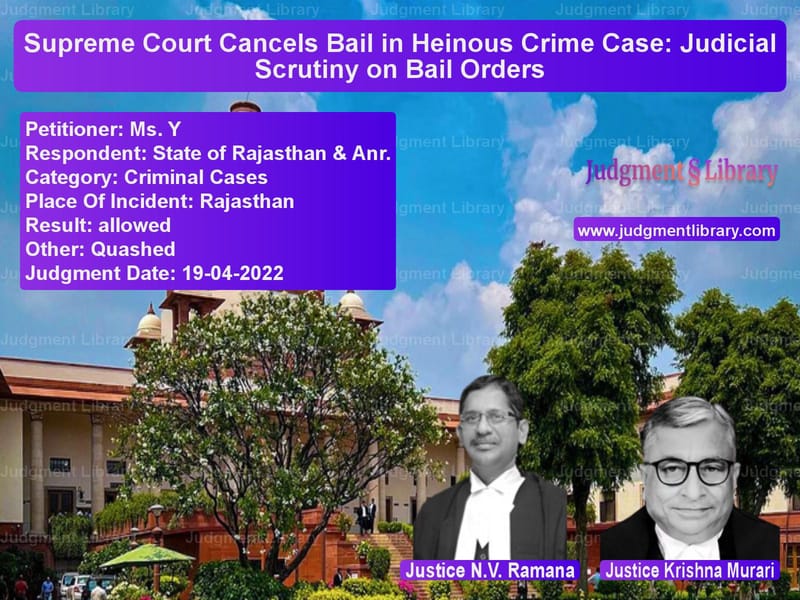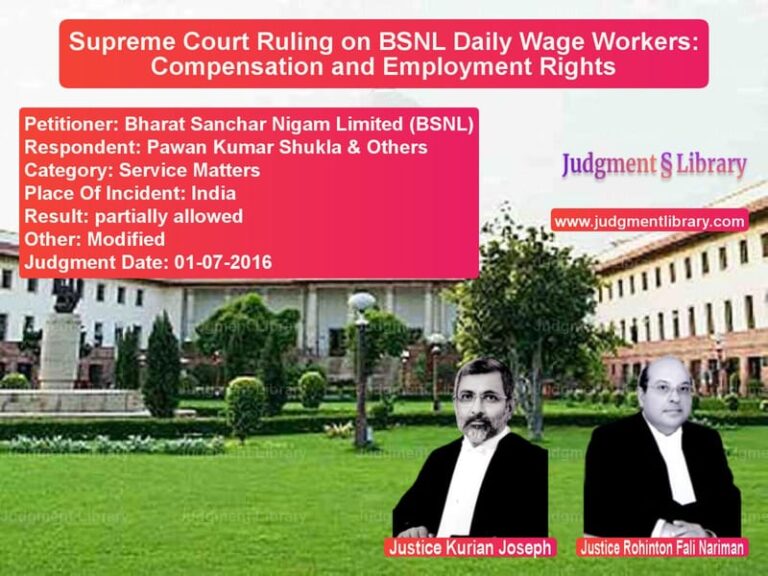Supreme Court Cancels Bail in Heinous Crime Case: Judicial Scrutiny on Bail Orders
The Supreme Court of India, in the case of Ms. Y vs. State of Rajasthan & Anr., set aside the Rajasthan High Court’s order granting bail to the accused charged with serious offenses, including rape and sexual assault under the Protection of Children from Sexual Offences (POCSO) Act. The ruling highlights the necessity of judicial scrutiny while granting bail in cases involving heinous crimes.
The judgment reinforces the principle that courts must provide reasoned orders while granting bail, especially in cases involving grave offenses. It also underscores the responsibility of courts to ensure that victims’ rights are protected, and judicial discretion is exercised judiciously.
Background of the Case
The case arose from an FIR registered on May 30, 2021, wherein the prosecutrix, a minor, accused the respondent (her uncle) of raping and sexually assaulting her multiple times over a span of three to four years. The accused had a criminal history, with nearly twenty cases, including murder, attempt to murder, and dacoity, registered against him. Despite the serious allegations and the accused’s criminal background, the Rajasthan High Court granted him bail in a brief order without detailed reasoning.
The prosecutrix challenged the bail order before the Supreme Court, arguing that the High Court failed to consider the gravity of the offense and the risk posed by the accused.
Petitioner’s Arguments
The prosecutrix’s counsel argued that:
- The High Court mechanically granted bail without considering the seriousness of the allegations.
- The accused had a long criminal history, making his release a threat to the prosecutrix and society.
- The High Court did not provide any reasoning for granting bail, which is against the settled legal principles.
- The bail order lacked any discussion on the potential influence the accused might exert on the witnesses.
Respondents’ Arguments
The accused’s counsel countered with the following arguments:
- The High Court had considered all aspects before granting bail.
- Interference in bail orders should be minimal, as held by previous Supreme Court rulings.
- There was no new material that warranted the cancellation of bail.
Supreme Court’s Judgment
The Supreme Court bench, comprising Chief Justice N.V. Ramana and Justice Krishna Murari, ruled in favor of the prosecutrix and canceled the bail granted to the accused. The key observations made by the Court were:
- Judicial Scrutiny in Bail Orders: The Court emphasized that bail orders must contain reasoning, especially in cases involving heinous crimes.
- High Court’s Failure in Applying Legal Standards: The judgment criticized the High Court for failing to consider the accused’s criminal history and the gravity of the offense.
- Impact on the Victim: The Court observed that granting bail in such cases without proper justification could intimidate the victim and undermine the justice system.
- Legal Precedents: The ruling cited previous Supreme Court judgments requiring courts to exercise caution while granting bail in serious cases.
Implications of the Judgment
This ruling has significant implications for the criminal justice system:
- Ensuring Victim Protection: The decision reinforces the need to protect victims from undue pressure and intimidation.
- Setting a Standard for Bail Orders: The judgment mandates that courts must provide clear reasoning while granting bail.
- Preventing Misuse of Judicial Discretion: It discourages courts from mechanically granting bail without considering all relevant factors.
- Upholding Rule of Law: The ruling ensures that justice is not compromised by procedural lapses.
Conclusion
The Supreme Court’s verdict in Ms. Y vs. State of Rajasthan & Anr. is a landmark ruling that reiterates the importance of judicial scrutiny in bail matters. By setting aside an unreasoned bail order in a serious crime case, the Court has reinforced the principle that justice must not only be done but also be seen to be done. This ruling serves as a guiding precedent for future bail applications involving heinous offenses.
Petitioner Name: Ms. Y.Respondent Name: State of Rajasthan & Anr..Judgment By: Justice N.V. Ramana, Justice Krishna Murari.Place Of Incident: Rajasthan.Judgment Date: 19-04-2022.
Don’t miss out on the full details! Download the complete judgment in PDF format below and gain valuable insights instantly!
Download Judgment: ms.-y-vs-state-of-rajasthan-&-supreme-court-of-india-judgment-dated-19-04-2022.pdf
Directly Download Judgment: Directly download this Judgment
See all petitions in Bail and Anticipatory Bail
See all petitions in Custodial Deaths and Police Misconduct
See all petitions in SC/ST Act Case
See all petitions in Judgment by N.V. Ramana
See all petitions in Judgment by Krishna Murari
See all petitions in allowed
See all petitions in Quashed
See all petitions in supreme court of India judgments April 2022
See all petitions in 2022 judgments
See all posts in Criminal Cases Category
See all allowed petitions in Criminal Cases Category
See all Dismissed petitions in Criminal Cases Category
See all partially allowed petitions in Criminal Cases Category







